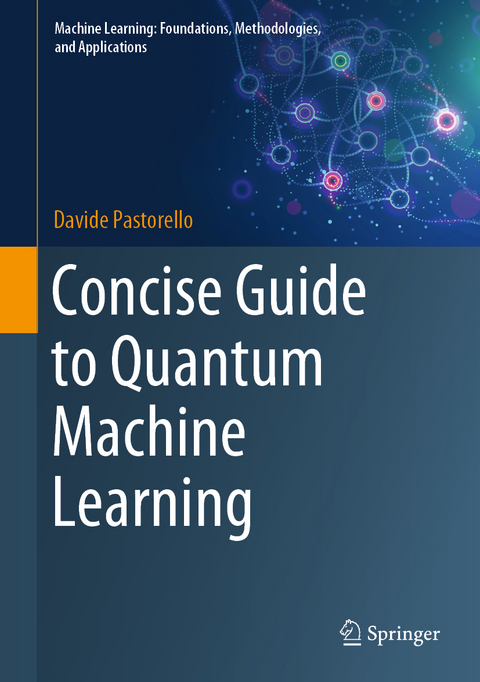
Concise Guide to Quantum Machine Learning
Seiten
2022
|
1st ed. 2023
Springer Verlag, Singapore
978-981-19-6896-9 (ISBN)
Springer Verlag, Singapore
978-981-19-6896-9 (ISBN)
This book offers a brief but effective introduction to quantum machine learning (QML). Instead, to immerse the reader in the quantum realm from the outset, the book starts from fundamental notions of quantum mechanics and quantum computing.
This book offers a brief but effective introduction to quantum machine learning (QML). QML is not merely a translation of classical machine learning techniques into the language of quantum computing, but rather a new approach to data representation and processing. Accordingly, the content is not divided into a “classical part” that describes standard machine learning schemes and a “quantum part” that addresses their quantum counterparts. Instead, to immerse the reader in the quantum realm from the outset, the book starts from fundamental notions of quantum mechanics and quantum computing. Avoiding unnecessary details, it presents the concepts and mathematical tools that are essential for the required quantum formalism. In turn, it reviews those quantum algorithms most relevant to machine learning. Later chapters highlight the latest advances in this field and discuss the most promising directions for future research.
To gain the most from this book, a basic grasp of statistics and linear algebra is sufficient; no previous experience with quantum computing or machine learning is needed. The book is aimed at researchers and students with no background in quantum physics and is also suitable for physicists looking to enter the field of QML.
This book offers a brief but effective introduction to quantum machine learning (QML). QML is not merely a translation of classical machine learning techniques into the language of quantum computing, but rather a new approach to data representation and processing. Accordingly, the content is not divided into a “classical part” that describes standard machine learning schemes and a “quantum part” that addresses their quantum counterparts. Instead, to immerse the reader in the quantum realm from the outset, the book starts from fundamental notions of quantum mechanics and quantum computing. Avoiding unnecessary details, it presents the concepts and mathematical tools that are essential for the required quantum formalism. In turn, it reviews those quantum algorithms most relevant to machine learning. Later chapters highlight the latest advances in this field and discuss the most promising directions for future research.
To gain the most from this book, a basic grasp of statistics and linear algebra is sufficient; no previous experience with quantum computing or machine learning is needed. The book is aimed at researchers and students with no background in quantum physics and is also suitable for physicists looking to enter the field of QML.
Davide Pastorello is an assistant professor in the Department of Information Engineering and Computer Science at the University of Trento.
Chapter 1: Introduction.- Chapter 2: Basics of Quantum Mechanics.- Chapter 3: Basics of Quantum Computing.- Chapter 4: Relevant Quantum Algorithms.- Chapter 5: QML Toolkit.- Chapter 6: Quantum Clustering.- Chapter 7: Quantum Classification.- Chapter 8: Quantum Pattern Recognition.- Chapter 9: Quantum Neural Networks.- Chapter 10: Concluding Remarks.
| Erscheinungsdatum | 21.12.2022 |
|---|---|
| Reihe/Serie | Machine Learning: Foundations, Methodologies, and Applications |
| Zusatzinfo | 5 Illustrations, color; 7 Illustrations, black and white; X, 138 p. 12 illus., 5 illus. in color. |
| Verlagsort | Singapore |
| Sprache | englisch |
| Maße | 178 x 254 mm |
| Themenwelt | Informatik ► Theorie / Studium ► Künstliche Intelligenz / Robotik |
| Naturwissenschaften ► Physik / Astronomie ► Quantenphysik | |
| Schlagworte | Machine leaning • Quantum Algorithms • quantum annealing • Quantum Computing • Quantum Neural Networks |
| ISBN-10 | 981-19-6896-9 / 9811968969 |
| ISBN-13 | 978-981-19-6896-9 / 9789811968969 |
| Zustand | Neuware |
| Informationen gemäß Produktsicherheitsverordnung (GPSR) | |
| Haben Sie eine Frage zum Produkt? |
Mehr entdecken
aus dem Bereich
aus dem Bereich
Buch | Softcover (2024)
REDLINE (Verlag)
20,00 €
Eine kurze Geschichte der Informationsnetzwerke von der Steinzeit bis …
Buch | Hardcover (2024)
Penguin (Verlag)
28,00 €


